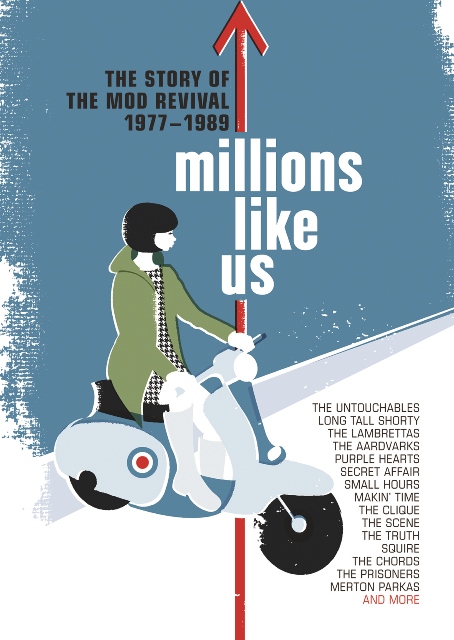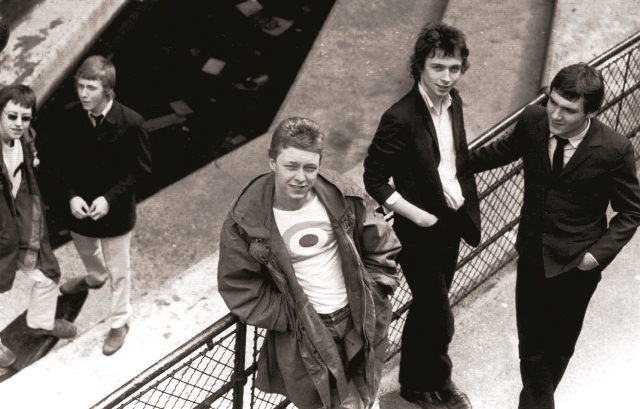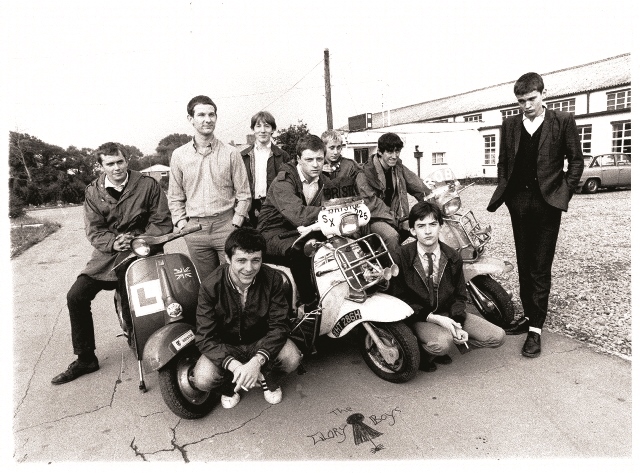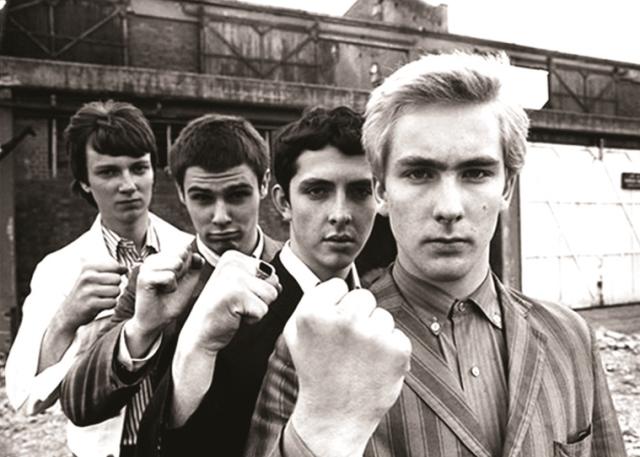 Various Artists: Millions Like Us - The Story of the Mod Revival 1977–1989
Various Artists: Millions Like Us - The Story of the Mod Revival 1977–1989
A “testosterone-fuelled youth movement” is how the opening paragraph of the introductory essay of this box set tags the mod revival. Aficionados of the “clean-cut, neatly dressed younger sibling of punk” were members of “an often violently defined tribe”. Concerts are described as battlegrounds: “punches were thrown” at “live appearances by The Chords.” In the individual commentaries on the 100 tracks collected, there is talk of “boot boys in parkas” and, for the band Small Hours, “live appearances sometimes blighted by violence.”
If the mod revival was in part defined by the macho, it is richly ironic then that the cover image of Millions Like Us depicts a parka-clad female mod atop her scooter.
Although selling a movement on its chauvinism is depressing, it reflects memories which bubble up of a mass of fist-raising young men chanting “we are the mods” at a 1979 Jam show at London's Rainbow. Not a scene for faint hearts. Undeniably, the mod revival’s bands were mostly male but it is shame that this borderline-aggresive gang mentality has been codified by this unprecedented box set. Interestingly, the lengthy annotation mentions the parallel 2 Tone movement but the equally interrelated skinhead resurgence is ignored.
 On one hand, a box set is about more than the music as it aspires to be a statement, robustly defining a band or a musical style – something Millions Like Us does with maybe too-much passion. On the other hand, a box set seeks to be an artefact, courting an audience by being covetable. With this in mind, Millions Like Us looks great. Inside the covers of the case-bound set are four CDs and a crisply designed, full-colour 48-page book with illustrations of the bands, ephemera and record sleeves. Artefactually, this attractive set is a pleasure. (pictured above left: The Chords)
On one hand, a box set is about more than the music as it aspires to be a statement, robustly defining a band or a musical style – something Millions Like Us does with maybe too-much passion. On the other hand, a box set seeks to be an artefact, courting an audience by being covetable. With this in mind, Millions Like Us looks great. Inside the covers of the case-bound set are four CDs and a crisply designed, full-colour 48-page book with illustrations of the bands, ephemera and record sleeves. Artefactually, this attractive set is a pleasure. (pictured above left: The Chords)
But – as with the disquieting inclination towards unquestioningly acknowledging male violence – there are niggles when the box ties itself in knots about what is and is not mod. The Donkeys were “a power pop band popular with mods” while “The Reaction probably weren’t a mod band” and “Q-Tips and Red Beans and Rice weren’t mod bands as such”. The punky Cigarettes had a “penchant for striped blazers ties and target T-shirts [which] betrayed their mod credentials” – the phrase “mod credentials” regularly crops up. The musical inclusivity of Millions Like Us gratifies and contrasts with the trend itself, but if the set stuck solely to representative tracks by bands like The Chords, The Lambrettas, Purple Hearts, Secret Affair and other explicit mod revivalists this would be a double-CD set at most.
Millions Like Us kicks off with the December 1977 A-side “Just Another Teenage Anthem” by the pre-Secret Affair new wavers and Jam support act The New Hearts, and completes its journey with The Aardvarks’ July 1990 (recorded in 1989) single “Arthur C. Clarke”. The inspirational Jam do not appear – presumably for licencing reasons – but all the expected names are compiled: Back To Zero, The Chords, The Lambrettas, Merton Parkas, Purple Hearts, Secret Affair and Squire. Lesser-known scene stalwarts include Beggar, The Circles, The Directions, The Teenbeats and Sta-Prest. The four discs are sequenced (mostly) in chronological order of release with Secret Affair’s “Time for Action” – track 11 on disc one – the point when the mod revival as such becomes known as such to the wider world. "We hate the punk elite" sings the band's Ian Page who, during punk, took the stage as Ian Pain.
 Unheard they may be, but The Jam loom musically over The Chords and The Jolt’s “See Saw” (actually written by Paul Weller). A more surprising band cropping up as a then-contemporary influence on disc one is Buzzcocks, whose “ESP” is borrowed as the chassis for Speedball’s terrific “No Survivors”. The Killermeters’ “Why Should it Happen to me?” is a rewrite of Buzzcocks’ “No Reply”. Once the mod revival does take off – the release of the film Quadrophenia in September 1979 is pinpointed as being as crucial as The Jam to its birth – the music becomes less punky and more reflective of Sixties styles, mainly the guitar-centric rock of The Who and Creation rather the American soul danced to by the original mods. (Pictured above right: Secret Affair and friends)
Unheard they may be, but The Jam loom musically over The Chords and The Jolt’s “See Saw” (actually written by Paul Weller). A more surprising band cropping up as a then-contemporary influence on disc one is Buzzcocks, whose “ESP” is borrowed as the chassis for Speedball’s terrific “No Survivors”. The Killermeters’ “Why Should it Happen to me?” is a rewrite of Buzzcocks’ “No Reply”. Once the mod revival does take off – the release of the film Quadrophenia in September 1979 is pinpointed as being as crucial as The Jam to its birth – the music becomes less punky and more reflective of Sixties styles, mainly the guitar-centric rock of The Who and Creation rather the American soul danced to by the original mods. (Pictured above right: Secret Affair and friends)
As the set progresses and the mod revival beds in as a default style to raid from pop's eating-itself cupboard, bands like the more-nuanced Makin' Time and the less-genre-specific Prisoners emerged. By the mid-Eighties, attitude rather than adopted style also counted. Paradoxically – after all, this was a revival – Millions Like Us traces a musical evolution: one which helped lay the table for the inwardness of the Britpop dead end and the eventual canonisation of Paul Weller.
For the already converted, Millions Like Us will be essential and a fine companion to the similarly minded 2005 box set Children of Nuggets. For everyone else though, this is a fascinating portrait of a stratum of Britain's music which, after The Chords, The Lambrettas, Purple Hearts and Secret Affair stopped having hits, did not go away but thrived at grass roots level. Also, in the main, it is crammed with infectious, Sixties-inclined, pop-rock toe-tappers. But try to overlook the salute to the mod revival’s aggressive side.















Add comment